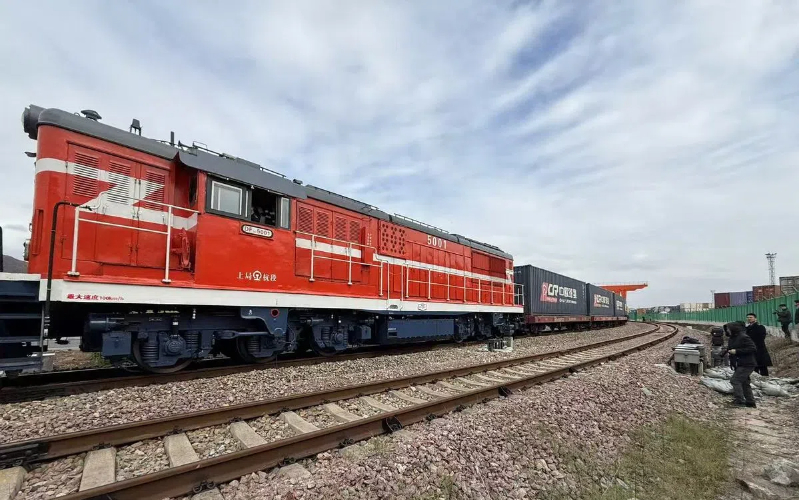
A freight train loaded with 110 standard containers — carrying daily necessities, auto parts, machinery equipment and other export goods — departed from Yiwu in eastern China's Zhejiang province, headed for Madrid, Spain, on Monday. This year marks the 10th anniversary of the route. [Photo provided to chinadaily.com.cn]
Monday marks a significant milestone for the China-Europe freight train service, as the route between Yiwu in Zhejiang province and Europe celebrates its 10th anniversary, according to China Railway Shanghai Group, the company overseeing and managing the service.
At 10:18 am on Monday, a freight train loaded with 110 standard containers — carrying daily necessities, auto parts, machinery equipment and other export goods — departed from Yiwu, heading for Madrid, Spain, which is more than 13,000 kilometers away.
This marks the 10th year since the launch of the Yiwu-Europe service, which has become a critical component of the China-Europe freight train and also facilitated global trade and logistics. Over the past decade, the Yiwu-Europe freight train has operated more than 6,700 trains, transporting over 670,000 containers. The service has provided a vital logistics backbone for Yiwu, which is often referred to as the "World's Small Commodity Capital", by supporting its "Buy Global, Sell Global" trade model.
The route between Yiwu and Europe is an important part of the China-Europe freight train. Since its launch in 2011, more than 100,000 China-Europe freight train trips have been operated, transporting over 11 million TEUs of goods, valued at more than $420 billion.
The broader China-Europe freight train network has experienced explosive growth. From its early routes, the network now spans 25 European countries, reaching 227 cities, while also extending to 11 Asian countries and more than 100 cities. This expansion has created a fully integrated transport corridor that facilitates the efficient movement of goods across Eurasia.
The continued success of the Yiwu-Europe freight train service is poised to play an even larger role in shaping the future of international trade. As demand for faster, more reliable logistics grows, the service is set to expand further, facilitating more efficient trade between China, Europe and beyond. The network's ability to bridge gaps between inland cities in China and major international markets underscores its strategic importance in global supply chains.
The growth and impact of this service not only reinforces the significance of the Belt and Road Initiative but also demonstrates China's pivotal role in driving global trade forward. With its ability to handle a wide array of goods, ranging from basic commodities to cutting-edge technologies, the China-Europe freight train service is well-positioned to meet the increasing demands of international trade in the coming years.